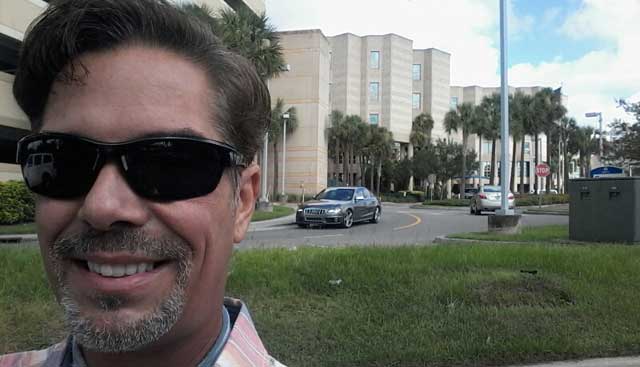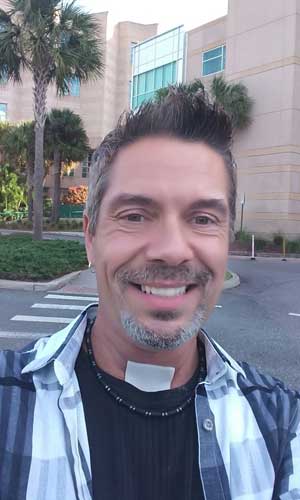
John's Story: Giving Back Through Music
John is a musician. He plays the piano and the organ. He was also a singer until stage 4 throat cancer made its debut in February 2016.
John was struggling to talk, eat, swallow and breathe and had lost more than 40 pounds. After unsuccessfully visiting three hospitals and four doctors who would not listen to John’s concerns, he finally found an ear, nose and throat doctor in the Ocala area who offered to do a biopsy. The mass was so large that they had to do a tracheotomy which revealed it was in fact cancer. The ENT doctor told John he may lose his voice box and referred him to local hospital, but John immediately said that he wanted to go to Moffitt Cancer Canter in Tampa.
"In April, upon walking into Moffitt Cancer Center, it did not feel like any other hospital I had ever been to. Employees smiled at me as I walked down the hallways and I felt so alive," he said. Right then, John knew he was at the right place.
John’s surgeon at Moffitt, Dr. Tapan Padhya, told him he would need to remove his voice box, as well as a few lymph nodes. The surgery took place on May 25, 2016.
 "On the day of surgery, I was in great spirits - laughing and making the nurses laugh," he said. "It was now time to have my voice box removed - never again being able to sing or talk without speaking devices. I woke up and the voice I was born with was gone, never to return and never to sing again, something I had been doing since I was a young kid."
"On the day of surgery, I was in great spirits - laughing and making the nurses laugh," he said. "It was now time to have my voice box removed - never again being able to sing or talk without speaking devices. I woke up and the voice I was born with was gone, never to return and never to sing again, something I had been doing since I was a young kid."
At the age of 49, John had to learn how to eat, swallow and talk again. But he quickly made the realization that you can't talk or sing if you're not alive! John was ready to tackle his new normal head on.
"After I was released from the hospital to recoup, I was finally able to eat again, but I was still learning to talk with my new Electrolarynx and would get very frustrated when people could not understand me. I sometimes felt like a ghost or I that didn't exist, but knew each day would get better."
John started working with a speech therapist and a nutritionist at Moffitt to monitor his weight while he completed 33 rounds of radiation and eight chemo treatments.
"I had a case worker who was simply outstanding," he said. "He actually returned emails and did what he promised unlike case workers at other hospitals. Still to this day, if he sees me on the schedule, he finds me in the hallways just to say hi and ask how I am doing. He is an outstanding Moffitt employee."
Upon John’s last treatment of radiation and chemo, he recalls feeling sad he wouldn't be visiting Moffitt as often. "I formed a close family with the Moffitt employees. Many of the employees showed up to watch me ring the bell of final treatment, something I will never forget."
"There is no place in the world like Moffitt Cancer Center. Everyone is here for the patients. I don’t feel like the employees here are employees – they're my family. That is the way I have been treated. The staff does not work for the paycheck, they work from the heart."
John noticed in his many visits to Moffitt that there was often a violinist and harpist playing in the waiting areas. He now plays music for patients in hopes that he is providing a soothing and relaxing atmosphere, just like he received when he was a patient. He may not ever sing again, but he is alive and giving back in ways far bigger than any voice can express.
